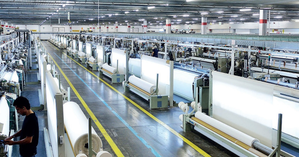Chennai: With a new textile policy on the horizon, people associated with the Tamil Nadu textile industry have appealed to the state government for support in modernising existing powerloom units.
Tamil Nadu textile industry stakeholders informed that traditional powerlooms require investment in new machinery or retrofitting to stay competitive.
The textile sector has also requested the state government to address challenges with Common Effluent Treatment Plants, particularly in managing and disposing of sludge generated from effluent treatment.
Recently, the Tamil Nadu Department of Handlooms, Handicrafts, Textiles, and Khadi conducted discussions with state textile industry associations in Chennai.
A department official said that several rounds of talks have taken place with industry stakeholders, and the new textile policy is expected to be announced soon.
He said that the policy will be updated to better reflect the current needs of the industry and build upon the 2019 textile policy.
The new policy aims to support units with less than Rs 50 crore in turnover in the man-made fibre (MMF) sector.
In addition, the state has issued orders to establish 10 mini textile parks. An integrated textile park near Salem, once approved by the Central government, is expected to provide solutions for processing industries in the region.
Notably, Tamil Nadu accounts for one-third of India’s textile business and is one of the largest textile manufacturing hubs globally.
The industry has generated employment for millions, including workers from other states. Earlier this year, R. Gandhi, Minister of Handlooms and Textiles, presented a policy note for the handlooms, handicrafts, textiles, and khadi sectors, outlining numerous benefits for the industry.
The new textile policy also seeks to bolster Tiruppur’s position in the apparel value chain. Tiruppur, known for its Rs 35,000 crore export business and Rs 25,000 crore in domestic trade, is expected to lead the way in Environmental and Social Governance (ESG) practices, attracting further investments.
The garment sector workforce in Tiruppur is predominantly composed of women, making up 80 per cent of its employees.
Industry stakeholders raised concerns over rising electricity costs, with textile units currently paying around Rs 9.5 per unit, a significant factor impacting operational costs.
Associations in Coimbatore and Tiruppur have urged the state to support the region’s struggling mills, with S.K. Sundararaman, Chairman of the Southern India Mills’ Association, noting that only 60 per cent of textile mills in Tamil Nadu are presently operational.
Sundararaman emphasised that investment-friendly policies in states like Gujarat, Maharashtra, and Madhya Pradesh are drawing businesses away, warning that without timely intervention, Tamil Nadu’s textile sector could face a severe downturn.
–IANS


Comments are closed.